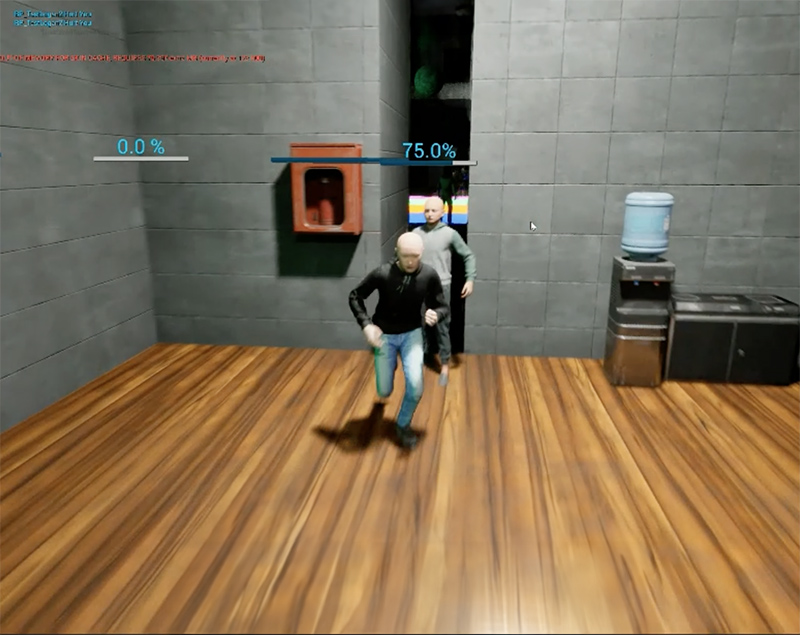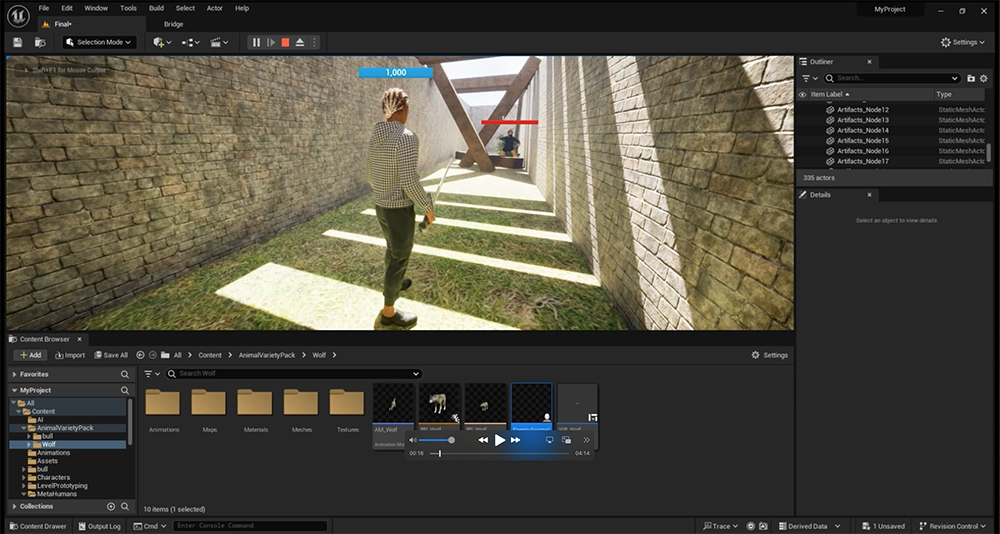
More than Fun and Games: How Game Engines II Prepares You For a Career in Tech
Published on: August 11, 2024

If you've played a video game, you probably have experience with a health bar – that brightly colored meter on the screen that slowly drains as your character takes damage. It's a pretty standard component in most video game experiences and has been since the medium's beginning.
But think for a second about how a health bar functions. It may seem simple, but for it to work as intended, it needs to connect to a host of other in-game elements: the player character, the attacks from enemies (which may cause the health bar to decrease in varying amounts), environmental elements that may cause damage, and more. And at the end, if that health bar decreases to zero, it needs to be programmed to serve up the big "game over" screen.
In other words, though health bars may seem like a simple, even basic element in games, their functionality and the ways they need to connect to other elements is quite complex, and offers a host of lessons about coding, development and the creation of virtual experiences. That's why learning how to design and code functional health bars is an early lesson in Husson's Game Engines II course, offered as part of the Extended Reality (XR) program offered by the School of Technology and Innovation.
Despite it's name and focus, that course offers an in-depth introduction to all that goes into not just the creation of video games but also for apps and immersive XR experiences. Most people may know what a health bar is, but most don't get to learn about how to design and build one or how that skill can translate to a variety of careers in the world of digital development. At Husson, you'll learn that and much more.
Now, power up your health and get ready to learn more about Game Engines II and all this program has to offer.
A Foundation of Real World Skill
In Game Engine II, students expand on the teaching and skill-building introduced in Game Engines I. In that prerequisite class, students get a general overview of Unity and Unreal, two widely used game engines, exploring fundamental concepts like physics, lighting, blueprints and more.
 Game Engines II, naturally, is like a "second level," according to Brave Williams, Director, iEX Center and Associate Professor, who helped design the course. In Game Engines II, students apply the knowledge they developed in the first course to designing and creating their own applications for a variety of devices, including desktop computers or mobile devices like iPhones and Androids.
Game Engines II, naturally, is like a "second level," according to Brave Williams, Director, iEX Center and Associate Professor, who helped design the course. In Game Engines II, students apply the knowledge they developed in the first course to designing and creating their own applications for a variety of devices, including desktop computers or mobile devices like iPhones and Androids.
And because the game engines studied and used in the class allow for real-time rendering, they're also ideal for developing XR experiences and applications. So the Game Engines students also get important background in that area.
"This class is about designing interactive environments, deploying to a variety of different pieces of hardware," Williams explains. "And then, it introduces you to the principles of XR, and how to create create tools for those environments. Video games are miniature worlds, spatial worlds. And so it's easy to move that concept into augmented reality. So really, the purpose of the class is not just game design, even though you use video game engines."
Experience Led Instruction
The Game Design II course is taught by Tharun Thiyagarajan, BCA, MBA, who has years of experience in developing games, apps and other technologies. His practical approach, grounded in hands-on skill building inspired by real-world, professional work, is an essential element of what makes this course such a well-rounded experience. Combined with Williams' more theoretical framework, the course offers a chance for students to get used to the practical realities and challenges of building applications while keeping the bigger picture and principles in mind.
"In this class, students are taught the whole lifecycle of building an app from start to end," Thiyagarajan says. Coming out of this course, he says, "Students can be Unreal developers, or they can be a level designer. They can become an indie developer and build their own applications, if they are interested in coding, they can just go for it. "
Build a Future Building Apps and Games at Husson
Ready to get in the game and start developing the skills that lead to a successful career? Husson's Game Design classes and plenty of other cutting edge courses await!
Request more info or apply today.
Back to All Articles